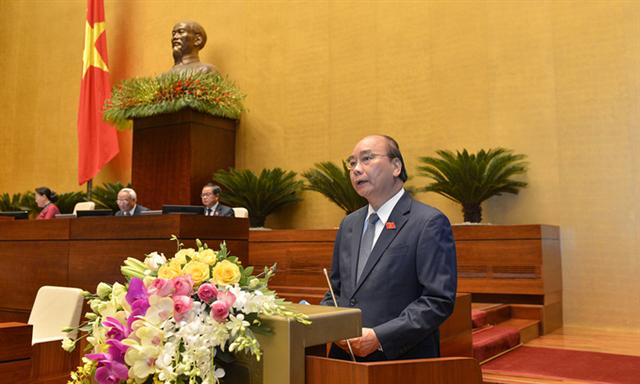Government proposes lower growth targets after Covid-19 impacts
Government proposes lower growth targets after Covid-19 impacts
Vietnam's government will submit lower economic growth targets to the parliament, given the disruption of trade and business activities by the coronavirus pandemic.
Prime Minister Nguyen Xuan Phuc speaks at a National Assembly session on May 20, 2020. Photo by VnExpress/Hoang Phong.
|
Prime Minister Nguyen Xuan Phuc said at a National Assembly session Wednesday that the pandemic has severely damaged all sectors, and the earlier economic expansion target of 6.8 percent will be difficult to achieve.
The government has earlier mentioned revised GDP growth targets of 4.5 percent or 5.4 percent this year, depending on the global situation.
Phuc said specific targets including other economic indicators will be submitted after obtaining approval from the Politburo, the main decision-making body of the Communist Party of Vietnam.
The government also wants to lower the export growth target from 7 percent to 4 percent, and for the fiscal deficit to increase by 1.31 percent to 4.75 percent. Public debt target will also increase by 3.2 percent to 55.5 percent of the GDP.
The Economic Committee of the National Assembly has noted that the coronavirus impact on the economy has been severe, reflected by the 10-year low in first quarter GDP growth at 3.82 percent.
National Assembly Chairwoman Nguyen Thi Kim Ngan acknowledged that all business, trade and investment activities have been disrupted by the pandemic. Drought, salt intrusion and hail have also adversely affected people’s lives, she added.
However, Vietnam has also received international acclaim for its effective response to the pandemic, achieving initial success in containing the virus, Ngan noted.
The country has gone 34 days without community transmission of the virus and recorded no death so far. The total count of active infections is 60 as 264 have recovered after treatment.
PM Phuc also proposed that lawmakers postpone a plan to increase the base salary of civil servants this year in order to allot more resources to support normal workers affected by the pandemic.
The National Assembly last year approved a 7 percent raise in civil servants’ basic monthly wages to VND1.6 million ($68) starting July 1 this year.
A civil servant’s salary is calculated by multiplying a base wage, which now stands at VND1.49 million ($64) after a 7.2 percent hike from July 1, with a coefficient determined by qualification and experience.
Public sector employees have complained for years that their earnings are too low. Local economists said at a recent conference that low wages will continue to foster corruption in the public sector.
In the current National Assembly session beginning Wednesday, lawmakers are set to ratify the landmark EU-Vietnam Free Trade Agreement (EVFTA) and the EU-Vietnam Investment Protection Agreement (EVIPA).
They will also vote on 10 laws, including the amended Law on Enterprises, the amended Investment Law, and the Public-Private Partnership (PPP) Law, and discuss six others.
The National Assembly is also scheduled to approve the government's proposal on converting the investment form of some projects on North-South Expressway sections from PPP to wholly state-owned investments.
The International Monetary Fund has forecast Vietnam’s GDP to grow at 2.7 percent this year while market research firm Fitch Solutions estimated it at 2.8 percent.





















